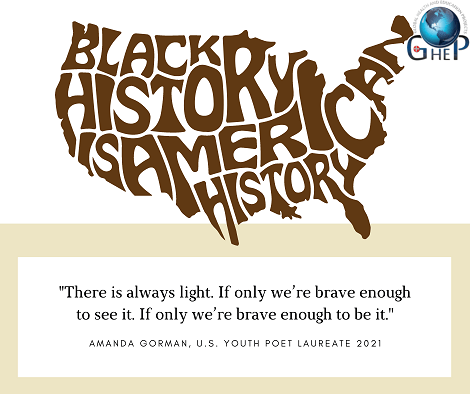Black History Month is every February. It is a time to celebrate the successes and triumphs of the African American community. This year’s celebration recognizes the great battle against repression and disenfranchisement that surrounds Black Americans from the distant past and up until the present day.
According to the History Channel, Black History Month, also known as African American History Month, grew out of “Negro History Week,” and was the brainchild of noted historian Carter G. Woodson and other prominent African Americans. The History Channel chronicles that since 1976, every U.S. president has officially designated the month of February as Black History Month. Other countries around the world, including Canada and the United Kingdom, also devote a month to celebrating Black history.
Accordingly, the 2023 Black History Month’s theme is “black resistance.”
Amanda Gorman, youth African American poet laureate in 2021, delivered a resounding and relevant address to the nation at the latest presidential inauguration of President Biden. One of her most crucial statements in her inauguration poem: “There is always light. If only we’re brave enough to see it. If only we’re brave enough to be it.” Spreading knowledge and inaugurating positive new beginnings–becoming light and not forces for darkness–is the point of resistance. Resistance is not about aggression, though confrontation may sometimes be necessary. It is about supporting each other to create a distinctive force for change and to fight against the past.
Enough words! Let’s have some music (as musically attuned as Gorman’s words are). Janelle Monae, the unbelievably prolific African American soundtrack creator, fashion powerhouse, rapper and singer demonstrates she’s an intersectional double threat. Namely, she focuses on LGBTQ+ pride and the strength of her black identity. She is shaping a positive sense of identity for all. And in 2015, she released a song to say the names of black people who lost their lives to police, humanizing them as individuals rather than letting them be statistics (“Hell You Talmbout”).
But black culture is not just pop culture. Dr. Dorceta Taylor, an African American, put the concept of environmental racism on the map. Author of two (academic) blockbusters–The Rise of the American Conservation Movement and Toxic Communities–Dr. Taylor is a giant of the environmental field who has reshaped the environmentalist and environmental studies landscape. Why should this matter to you? Because environmental justice frames the conversation of nature access and environmental health as an equity and civil rights, rather than as a “color-blind,” issue.
Finally, politicians have made the fight against oppression practical ever since it became possible for black people to get elected (mostly after the heroic actions of the civil rights era). The fruit of centuries of efforts even yielded the ascendancy of an Indian American and African American Vice President, Kamala Harris. Senator Cory Booker, an African American, perhaps said it best: “Hope is the active conviction that despair will never have the last word.” And for Senator Booker and others like him, hope is a crucial part of resistance–an antidote against painful circumstances.
But other unsung heroes exist. Today, we would like to highlight GHEP’s Family Tree Adoption Program participants and diaper program recipients for their small resistance. Rather than sinking to circumstances, our diverse client population opts for hope in changing their lives. They implement environmental justice into their lives by planting trees and shrubs, while diaper recipients improve their well-being and their children’s by collecting diapers from our diaper bank.
We hope this post has brought you hope and energy to do good work that will benefit the community. Enjoy your celebrations. What are you doing for Black History Month? Drop us a note and let us know.

